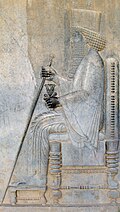Abulites



Abulites(Greek:Ἀβουλίτης) was theAchaemenidsatrap(governor) ofSusianaduring the reign ofDarius III(336–330 BC), and retained the satrapy as a Hellenistic satrap underAlexander the Greatuntil circa 324 BC, when he was executed forsedition.
Surrender to Alexander
[edit]He may have been ofElamiteorigin, although his son,Oxathres(GathaAvestan:Huxšathra), bears anIranianname, "one that seems distinctlyZoroastrian".[4]After theBattle of Gaugamela(331 BC), the Mesopotamian province of the Achaemenid Empire quickly fell toAlexander.Thereafter, Abulites had no choice but to surrender nearbySusa.After entering Susa, Alexander captured "a vast collection of treasure, including 50,000talentsof silver iningots".[4]Treasure fromXerxes'campaign in mainland Greecewas found and taken as well. Some statuary from Athens, such as the bronze statue ofHarmodius and Haristogiton,"the Tyrant-slayers", was recovered by Alexander inSusa.[5]Susa was the co-capital of the Achaemenid Persian Empire, but the "hoarding of specie" does illustrate the "shortsightedness of Achaemenidfiscal policy"according to C. J. Brunner.[4]
As Alexander was preparing to move intoPersis,he left a garrison under the MacedonianXenophilus(who replaced the Persian commandant Mazarus), and reconfirmed Abulites as satrap of Susania, "holding civil jurisdiction".[6][4]Abulites remained satrap until Alexander's return from hisIndian campaign;in the meantime, Abulites may "have moved to assert his independence".[4]Though this remains unclear, Abulites and his son were "promptly arrested and executed".[4]"Immediately afterwards", Alexander organized themass weddings at Susa,"thus again showing his commitment to the ideal of Greek and Persian partnership".[4]
Gedrosian desert and coinage
[edit]Plutarch(Alex.68.7) relates a story in which Abulites was requested by Alexander to bring supplies after the disastrous crossing of theGedrosian desert,but Abulites instead brought huge amounts of coinage, about 3000 tales (86 tons).[3]In a rage, Alexander threw the coins at horses, asking what help this would be to a hungry army. Alexander shouted "What good have you done having broughtthis?".Thereafter Abulites was jailed by Alexander.[3]Some of these coins may have been the "Porus"coins of Alexander, struck in 325-323 BC inBabylonorSusa,which often bear the initials "AB" and "Ξ", possibly identified with the initials of Abulites and his associated Macedonian generalXenophilus.[3]
References
[edit]- ^Holt, Frank L. (2003).Alexander the Great and the Mystery of the Elephant Medallions.University of California Press. p. 105.ISBN9780520238817.
- ^CNG: KINGS of MACEDON. Alexander III 'the Great'. 336-323 BC. AR 'Medallion' of 5 Shekels or Dekadrachm (33mm, 38.75 g, 5h). Local (Satrapal) mint in Babylon. Struck circa 325-323 BC.
- ^abcdHolt, Frank L. (2003).Alexander the Great and the Mystery of the Elephant Medallions.University of California Press. pp. 105–106.ISBN9780520238817.
- ^abcdefgBrunner 1983,p. 228.
- ^D'Ooge, Martin Luther (1909).The acropolis of Athens.New York: Macmillan. p.64.
- ^Heckel 2009,p. 38.
Sources
[edit]- Brunner, C.J. (1983). "ABOULITES".Encyclopaedia Iranica, Vol. I, Fasc. 3.p. 228.
- Heckel, Waldemar(2009). "Alexander's Conquest of Asia". In Heckel, Waldemar; Tritle, Lawrence A. (eds.).Alexander the Great: A New History.Blackwell Publishing.ISBN978-1444360158.

